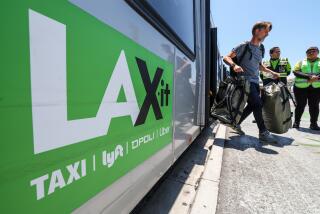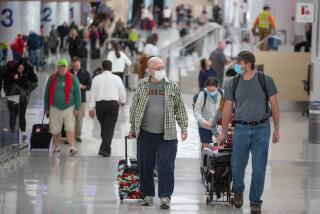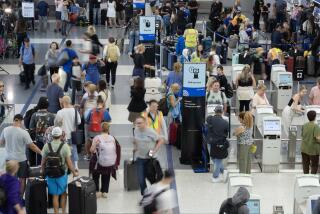Lengthy Waits at Airports
Passengers at Los Angeles International Airport waited up to three hours to reach their departure gates Friday, as the nation’s commercial aviation system lurched back into operation.
Even after reaching their gates, travelers had no assurance that they would be taking off. Many airlines weren’t flying yet, and the big five that were--American, United, Delta, Northwest and Southwest--offered limited schedules.
If it was bad at LAX, it was just a pale reflection of problems at other airports, especially around New York, where the three major airports serving the city were shut down from 3 p.m. Thursday to 8:20 a.m. Friday, because of security concerns. Boston’s Logan airport remained closed all day Friday.
Most passengers seemed to take the delays and flight cancellations with good grace. And officials said that was fortunate, because even the toughest restrictions are likely to remain in place for the foreseeable future.
“I think everyone realizes that what the terrorists did is far worse than anything we may have to endure,” said Betty Browning, at LAX, after negotiating lines at Southwest Airlines that snaked out of the terminal and onto the sidewalk.
“There’s a reason for these delays,” said her husband, Tom Browning. “It’s not like the airline people are a bunch of incompetents.’
At the peak hour of 3 p.m. PDT Friday, air traffic was a little more than half of normal, with about 3,000 commercial jetliners being tracked by radar over the United States. Actual passenger traffic was even lighter, since an unusual number of those flights were repositioning aircraft and carrying no passengers.
Bomb Scares, Arrests Add to Airport Delays
Although most major airfields had reopened at 8 a.m. Thursday, the return to service was slow, interrupted by bomb scares, arrests of possible suspects and difficulties setting up new security processes ordered by the Department of Transportation.
The shutdown left planes stranded from Maui to Montreal, and it took most airlines a day or more to transfer their jetliners and flight crews to airports where they were needed.
Only 100 flights took off and landed at LAX on Thursday. By Friday, that figure had climbed to 500. Normally, there are more than 2,000.
American Airlines, the nation’s biggest carrier, got only one-third of its normal flights into the air Friday. TWA, now being absorbed by American, flew 65% of its normal schedule.
U.S. carriers such as Northwest were allowed flights into this country, but many foreign carriers were still banned from landing because they had yet to comply with new Federal Aviation Administration security rules.
Several foreign carriers diverted U.S-bound flights to Canada. Some flights that had already taken off from Portugal and Italy turned around and headed back to Europe.
In Los Angeles, thousands of travelers descended on LAX despite warnings that they were in for lengthy delays. Many soon found themselves trapped in a numbing quest for a flight out. In addition to the shortage of planes and flights crews, the delays stemmed from cumbersome new parking, ticketing and security procedures.
Passengers were no longer permitted to use the parking lots and parking structures within the airport grounds. Instead, they had to park at public and private lots as much as a mile from the airfield and take shuttle buses to the airline terminals. For many, that process took about 45 minutes.
At the terminals, curbside check-ins--which have eased the burden on ticket counters--were not permitted. It took some passengers up to two more hours to reach the front of the serpentine ticket lines.
Debbie Blumberg, 55, found herself caught in a line at Southwest that looped through the terminal, out the door, down the sidewalk and back into the terminal again.
Blumberg, who was heading home to Kentucky after visiting her mother in Valencia, was hauling two big suitcases and pushing a stroller containing her 2-year-old daughter Carryn.
“I’m resigned to it,” she said. “I just hope the bars are open.”
The bars were open at Southwest, but the restaurants weren’t. In fact, most eateries throughout LAX remained closed Friday. And there are no meals served on Southwest flights.
At least Blumberg caught her flight.
Provi Torres, 71, thought she had lucked out. Torres was on her way home to Miami after coming to Los Angeles to attend the Latin Grammys, which were canceled. She negotiated the ticket line at American Airlines in less than an hour. But once she got to the counter, Torres found that her flight had been canceled and she had been re-booked on a flight that leaves Sunday.
“Well, it looked good at the beginning,” she said with a grim smile.
Smaller bottlenecks of about 15 minutes loomed at security checkpoints as bags were scrutinized more closely. Once travelers reached the gates, missing planes and crews still doomed many to longer waits, if not cancellations. In some LAX terminals, seating was at a premium, and travelers sprawled on the floors.
In contrast, passengers arrived at the Burbank airport terminal Friday to find the place virtually deserted. Parking lots were almost empty and waiting lines were nonexistent.
Boston Airport Under Tight Security
Some of the biggest knots in the nation’s air traffic system have yet to be untied.
In Boston, Logan International Airport will not reopen until 5 a.m. today, at the earliest. The airport’s security measures were under sharp scrutiny because two of the terrorist flights originated there.
The airport’s managers said they have instituted security measures that exceed the FAA’s new requirements. State police will conduct random checks of passengers and carry-on luggage, for example, and police will patrol ramp areas, crawl spaces and construction sites, said Thomas Kinton Jr., director of aviation at the airport.
Stockton, Calif., natives James and Greta Gillies--waiting in a bar at the Hyatt Harborside hotel at Logan airport, said they felt they could not go anywhere lest they miss a chance to grab a flight home after their vacation in Maine.
“All I want to do is go back to Stockton,” she said of her hometown. “Nothing would happen there. Nobody would want to bomb Stockton.”
Friday’s airport inconveniences aren’t likely to go away any time soon. Passengers can expect many of the heightened security procedures to remain in effect for months, if not longer, officials said.
LAX terminals probably will have to be renovated to provide more room for waiting passengers near ticket counters and security checkpoints, officials say. A long-term absence of curbside check-in is expected to continue to cause long lines at ticket counters, since skycaps often checked up to 50% of the bags outside some terminals.
LAX travelers have found a rule banning private vehicles from the terminal area particularly onerous--forcing them to board shuttle buses at outlying lots B and C. But airport officials are reluctant to discuss how long on-site parking will be banned. (LAX officials were to get permission from federal officials to keep on-site airport parking in place during the Persian Gulf War, even when other airports had to ban private cars.)
But Mayor James K. Hahn, after a walk-through around LAX on Friday, made it clear patrons may have to live without close-in parking.
“These lots will be closed to passengers,” Hahn said, noting that the future use of the space will be “up for grabs.”
Hahn also urged that the federal government, rather than the airlines, control security near terminal gates. “Airport security has to be done on the national level,” the mayor said.
If it was needed, passengers who finally found themselves in the air received one final reminder of how much air travel in America has been altered. Inside their rolled-up napkins were a plastic spoon and a fork, but no knife.
One day, precautions against the most innocent weapons may seem silly. But few complained last week.
A flight attendant serving passengers in the business-class cabin of Delta’s Flight 1818 from Atlanta to Manchester, N.H., said, “If we have our way, those real plates and glasses will also be replaced by plastic.”
*
Times staff writers Miles Corwin, Annette Kondo, Elizabeth Mehren, Jean Merl and James F. Smith contributed to this story.
More to Read
Sign up for Essential California
The most important California stories and recommendations in your inbox every morning.
You may occasionally receive promotional content from the Los Angeles Times.










